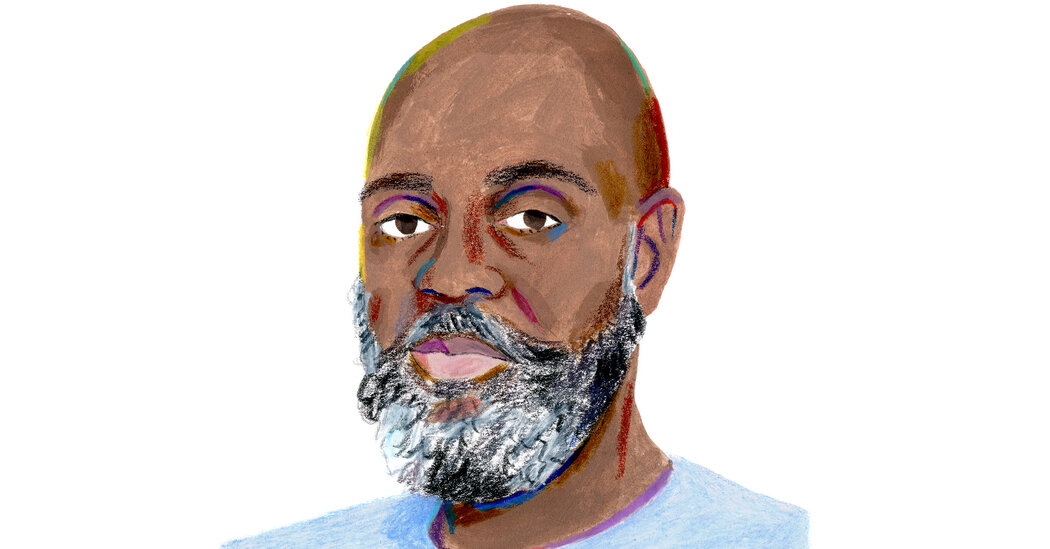In an email interview, the poet celebrated reading aloud, romance novels and bringing libraries to prisons. SCOTT HELLER
What books are on your night stand?
“Joyful,” by Ingrid Fetell Lee; “Don’t Read Poetry,” by Stephanie Burt; and “Figures of Speech,” by Arthur Quinn. “Joyful” is really dope — making the case for how beauty, which is what we bring to folks in prison with our Freedom Libraries, brings joy to people on the inside.
What’s the most interesting thing you learned from a book recently?
Reading “The World’s Fastest Man,” Michael Kranish’s biography of Major Taylor, I learned that the bicycle was the center of the Industrial Revolution. Learned that, barely after antebellum slavery, Taylor was an international star. Learned, too, that Taylor died tragically trying to escape poverty by telling the story of his remarkable life.
In a campus appearance, you asked a student when he last had a poem read out loud to him. Why was that an important question?
I like random acts of poetry, moments when we bring poems into the air and into each other’s orbits. I find it interesting that many of us, as students of poetry, weren’t called on to do this more. Then, I remember that it’s only with this book that I have done that consistently. And having done it, will say it’s been an amazing experience, reading poems to people in the streets, in Ubers, on planes and trains.
What’s the last great book you read?
“A Gentleman in Moscow,” by Amor Towles.
Your favorite book no one else has heard of?
“Figures of Speech,” by Arthur Quinn.
Who is your favorite fictional hero or heroine? Favorite antihero or villain?
Tracker from Marlon James’s “Black Leopard, Red Wolf.” Wildly enough, Tracker really is all three. And maybe that’s the point. So much of life is imagining that you are in the “right,” and often you very well may be, but what James reveals is that there is never a single story, and sadly sometimes we are all three — hero, antihero and villain — and we are all three unwittingly, no matter how earnest and sincere we are in this world.
Do you count any books as guilty pleasures?
I sometimes gotta go back to the romance novel. I mean, who among us hasn’t wanted to have minutes or hours or days living in that moment of love Zora Neale Hurston captures when we learn who Tea Cake is? And for me, these days Jasmine Guillory is a guilty pleasure.
What book would you recommend for understanding this political moment?
Ralph Ellison’s “Invisible Man.” It’s a book about what happens when the society is so chaotic that it leaves no room for the individual to change or grow. Ellison’s unnamed character is the star of a picaresque, lost in a world that shape-shifts so rapidly and absurdly that he cannot create an identify for himself. Imagine being unwilling to utter your own name.
Do you listen to music while writing? What kind?
Been leaning into music without words. Listening to a lot of Frank London, especially “Spirit Stronger Than Blood,” paying attention to the different rhythms and blends I can discover to bring to my voice.
A book of poetry about dogs called “Doggerel”: Any second thoughts about the title?
It’s me thinking about what it means to learn something about the world from Taylor, a Jack Russell terrier who joined my family during the pandemic — and how that first dog helped me see so many things anew. But also, the title, it means garbage poetry — and I wanted it to be tongue in cheek. To say that these are poems that speak to everyone, that pun and riff and make fun of themselves a bit as they reveal something about the world.
Did the dogs make appearances in your poems one by one, or did you set out to write about loyalty and companionship?
Once, this guy stops me while I’m walking Taylor. It’s 6 a.m. and he pulls his car off the road. He yells, I have TWO and pulls out his phone to show me his Jack Russell terriers. The days became wild in that way, and the dogs showed up in that way.
Making books available to prisoners changed your life. What does the future of Freedom Reads look like now?
For a long time I was just looking to find work. Freedom Reads has allowed me to find joy. To bring beautifully handcrafted bookcases and a specially curated 500-book collection into the everyday lives of folks in prison. And to have a team of people who have loved ones in prison, have taught in prison, or have served time in prison making the work happen. It’s humbling; the future looks like us putting a Freedom Library in every cellblock in every prison in the United States.
What’s the last book you’ve recommended to a member of your family?
“The Memory Police.”
You’re organizing a literary dinner party. Which three writers, dead or alive, do you invite?
Lucille Clifton, Harold Bloom, Toni Morrison.
